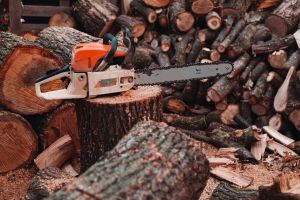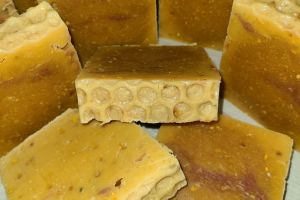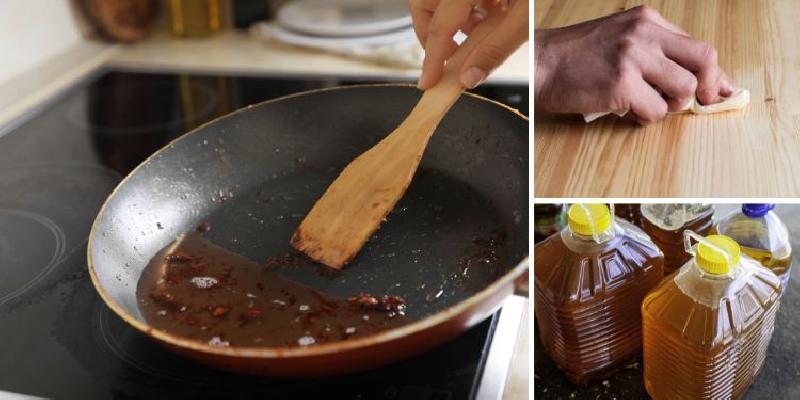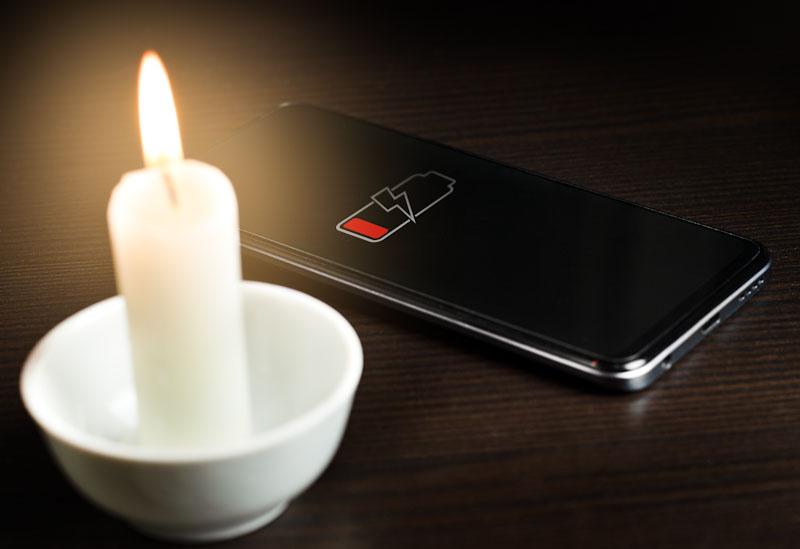If you have expired cooking oil, don’t throw it away!
One of the key aspects of living a self-sufficient lifestyle is becoming resourceful by finding multiple uses for the many items in your home. One of the most multipurpose items that you probably have in your home (and specifically in your kitchen) is cooking oil.
Besides its intended uses for frying and baking foods, there are a myriad of other cool roles that cooking oil can serve for you as well.
Biodiesel Production
One of the most practical uses for used cooking oil is converting it into biodiesel. This fuel can power diesel engines without major modifications.
The process involves filtering the oil and treating it with methanol and lye. Producing biodiesel at home is a cost-effective way to save money on fuel and increase self-sufficiency.
Plus, it’s a smart solution for making the most out of something you’d otherwise throw away.
Remove Rust From Your Metal Gear
Do you have any metal tools or objects that are rusting? Perhaps a firearm, a knife, an ax, kitchen utensils, or any gardening tools you have? If so, you can use cooking oil to help remove it.

Vegetable oil is the best choice for removing rust from cast iron, while linseed cooking oil is ideal for removing rust from steel. Just mix a generous amount of cooking oil with two or three tablespoons of salt, and then dampen a rag or a paper towel in the resulting solution.
Proceed to scrub the rusty area vigorously.
Rust Proof Your Metal Gear Before It Rusts
Better yet, you can also use cooking oil to rust-proof your metal gear before it can even rust in the first place.
The reason why cooking oil can be used to protect your gear is because the molecules present in the cooking oil cannot be dissolved in water, as the two repel each other.
That’s why you can apply a thin layer of cooking oil to the metal surfaces of whatever gear or tools you want to protect and it should keep rust at bay.
Lubricate Chainsaws

Do you have an old chainsaw where the chain is having a little difficulty removing?
If so, old canola oil can serve as an excellent alternative to chainsaw lubricant.
This is because canola has a high viscosity level and excellent lubricity.
Protect Wood From Rotting
It’s not just metal that you can protect with old cooking oil. You can use it to protect wood as well. As mentioned above, cooking oil will repel water because the molecules will not dissolve in it.
As a result, when you apply a layer of it over the surface of wood, it will stop the wood from absorbing water, which could cause it to expand and eventually rot.
A good use case for this is with gardening tools, the wooden components of which are often vulnerable to moisture.
Protect Your Leather
You can also use cooking oil to protect leather to stop it from cracking. You can do this with belts, shoes, saddles, bags/backpacks, or holsters.
All it takes is a small amount of cooking oil to gently apply over the surface of leather, and it should protect the leather against cracking for at least a month.
Get a Fire Going
Old cooking oil can also be an ideal solution to help you get a good fire going.
Simply rub some cooking oil onto whatever you are using for kindling or tinder, such as old newspaper, moss, or twigs or small pieces of wood.
Then bring it into contact with a spark generated by a magnesium flint striker or a flame from a lighter or match, and the cooking oil should catch fire instantly.
Remove Paint
You’re probably acutely aware that it can be very difficult to get paint removed from your hands, body, or clothes after a painting job. One of the easiest ways to get paint removed, however, is to use cooking oil.
Simply rub the cooking oil directly onto the paint and you’ll start to notice the paint scrubbing away. Then you can apply water mixed with soap to wash the cooking oil away. It’s really that easy.
Make Your Own DIY Soap
It’s also super easy to make your own DIY homemade soap using cooking oil and lye. Just follow these steps:

- Add around 2.5 ounces of lye to around 5 ounces of water (not the other way around). Stir the mixture together gently, until the lye is fully dissolved.
- Strain the used cooking oil to remove any impurities, then heat approximately 18 ounces over the stove until it reaches around 212 degrees Fahrenheit or 100 degrees Celsius.
- Remove the cooking oil from the stove and allow it to cool.
- Now mix the lye-water solution and the cooking oil together by adding the lye solution to the pot with the oil.
- Stir the mixture together until it thickens, then pour it into soap molds.
- After 24-48 hours, remove the soap from the molds. It should be firm enough to handle.
- Place the bars on a drying rack in a well-ventilated area and allow them to cure for 4-6 weeks. Turn the bars occasionally to ensure even curing.
Make Your Hinges Stop Squeaking
Do you have any door hinges that are annoying squeaking when you open and close the door?
If so, just apply a small amount of lubricant to the hinges and the squeakiness should start to go away.
Livestock Feed Supplement

Used cooking oil can also be repurposed as a feed supplement for livestock, adding valuable calories to their diet.
Mix it with regular feed to provide an energy boost for animals such as pigs and chickens. To boost and even double egg production in chickens, consider mixing it with this plant.
However, it’s important to ensure the oil is properly filtered and free from harmful contaminants. Introduce the oil gradually into their diet and monitor the animals for any adverse reactions. This method not only reduces waste but also supports the health and productivity of your livestock.
Keep Mosquitoes Away
Do you have any areas on your property or campsite with a lot of mosquitoes around? Cooking oil could be the next best thing that you have on hand to help solve this problem, other than mosquito repellant.
Apply a half teaspoon of vegetable oil to every gallon of water where mosquitoes are congregating and breeding. The mosquitoes won’t stand the oil and it won’t take long for them to go away.
Harden Soil
Cooking oil will travel around an inch down into the soil and cause it to toughen up, especially as people walk or cars drive over it. This will help prevent dust from coming up while you walk or drive, which could be useful in your driveway or any dusty areas in your backyard.
Just make sure that you don’t use cooking oil over any areas with plant growth, as the oil can suffocate the roots.
There are many more survival and DIY uses for cooking oil as well, but the above are perhaps the ones that you are most likely to use.
via askaprepper




